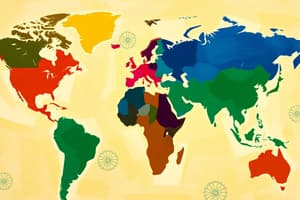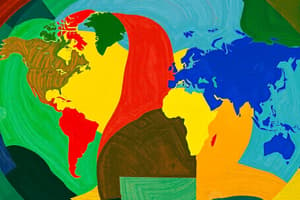Podcast
Questions and Answers
Which description best captures Jose Alvarez's concept of international organizations?
Which description best captures Jose Alvarez's concept of international organizations?
- Entities that are easily controlled by member states.
- Ultimate authorities that impose will or decisions. (correct)
- Informal groups that meet occasionally for dialogue.
- Representations of democratic ideals and cooperation.
What distinguishes intergovernmental organizations (IGOs) from non-governmental organizations (NGOs)?
What distinguishes intergovernmental organizations (IGOs) from non-governmental organizations (NGOs)?
- NGOs focus on policy-making, whereas IGOs focus on enforcement.
- NGOs are always informal, while IGOs are formal entities.
- IGOs address local concerns, while NGOs operate globally.
- IGOs are established by states through treaties, while NGOs are established by non-state actors. (correct)
What is a key characteristic of informal international organizations?
What is a key characteristic of informal international organizations?
- They meet regularly to discuss global issues.
- They pursue cooperation without a formal treaty. (correct)
- They require membership fees to participate.
- They operate under a strict legal framework.
Which of the following is an example of a non-governmental organization (NGO)?
Which of the following is an example of a non-governmental organization (NGO)?
Which statement reflects a common critique of international organizations?
Which statement reflects a common critique of international organizations?
What distinguishes international organizations (IOs) from informal organizations?
What distinguishes international organizations (IOs) from informal organizations?
Which of the following statements is true regarding the membership of international organizations?
Which of the following statements is true regarding the membership of international organizations?
Which type of organization primarily focuses on 'rule-making'?
Which type of organization primarily focuses on 'rule-making'?
Which of the following is a characteristic of international organizations?
Which of the following is a characteristic of international organizations?
What is the main difference between intergovernmental and supranational decision-making authorities?
What is the main difference between intergovernmental and supranational decision-making authorities?
Which example represents a limited or issue-specific international organization?
Which example represents a limited or issue-specific international organization?
In the context of international organizations, what does 'compliance' refer to?
In the context of international organizations, what does 'compliance' refer to?
Which term describes organizations that execute policy and monitor compliance?
Which term describes organizations that execute policy and monitor compliance?
What do liberals assume about humans based on Enlightenment principles?
What do liberals assume about humans based on Enlightenment principles?
According to liberalism, what is a key condition for states to peacefully cooperate?
According to liberalism, what is a key condition for states to peacefully cooperate?
What is one limitation of liberalism when studying international organizations (IOs)?
What is one limitation of liberalism when studying international organizations (IOs)?
What does 'interest-group liberalism' emphasize in the context of the national interest?
What does 'interest-group liberalism' emphasize in the context of the national interest?
How do liberals view the role of international organizations in achieving peace?
How do liberals view the role of international organizations in achieving peace?
Which theory focuses on the formal and informal rules governing international relations?
Which theory focuses on the formal and informal rules governing international relations?
What criticism do liberal theories face regarding the study of international organizations?
What criticism do liberal theories face regarding the study of international organizations?
Which thinker associated with liberalism believed in democracy as a cornerstone for international cooperation?
Which thinker associated with liberalism believed in democracy as a cornerstone for international cooperation?
What is one of the functions of the Assembly according to Article 3?
What is one of the functions of the Assembly according to Article 3?
Which organization is noted as one of the oldest and has grown out of the labor movement?
Which organization is noted as one of the oldest and has grown out of the labor movement?
What is required for admitting new members to the League of Nations?
What is required for admitting new members to the League of Nations?
When did countries start sending permanent representations to the League's headquarters?
When did countries start sending permanent representations to the League's headquarters?
How many permanent members were part of the Council of the League?
How many permanent members were part of the Council of the League?
Which of the following was NOT a subject of the Special Commissions?
Which of the following was NOT a subject of the Special Commissions?
Which majority is required for procedural decisions in the Assembly?
Which majority is required for procedural decisions in the Assembly?
Which permanent member left the Council in 1937?
Which permanent member left the Council in 1937?
What was one major reason for the failure of the League of Nations in enforcing its decisions?
What was one major reason for the failure of the League of Nations in enforcing its decisions?
Which Secretary-General of the League of Nations served the longest term?
Which Secretary-General of the League of Nations served the longest term?
Which factor contributed to the loss of credibility of the League of Nations?
Which factor contributed to the loss of credibility of the League of Nations?
What major issue arose from the League's inability to reconcile deterrence and disarmament?
What major issue arose from the League's inability to reconcile deterrence and disarmament?
How did economic nationalism affect the League of Nations' objectives?
How did economic nationalism affect the League of Nations' objectives?
Study Notes
Introduction to International Organizations
- International organizations (IOs) are “secular gods” (Jose Alvarez) with ultimate authority and power.
- IOs are also considered “Frankenstein monsters” (Jose Alvarez) because they are difficult to control once they gain power.
- Mark Mazower views them as symbols of “imperial internationalism” due to their lingering influence from past imperial practices.
- President Trump's view of the UN as a “club for people to get together, talk and have a good time” highlights a more informal perception of certain IOs.
Types of IOs
- Intergovernmental Organizations (IGOs) are established by states through treaties and are based on inter-state agreements.
- Non-governmental Organizations (NGOs) are established by non-state actors and are driven by “common purpose.”
- IOs can be formal (with treaties and rules) or informal (coalitions of states without treaties).
- IOs are a type of international institution, but not all international institutions are IOs.
Characteristics of International Organizations
- Formal IOs feature:
- Formal treaty basis
- Formal rules and procedures
- Regular state meetings
- At least 3 member states
- Bureaucracy/headquarters
- Informal IOs lack these features.
Categorizing IOs
- Membership:
- Universal: Every state can join (e.g., UN).
- Limited: Only certain states can join (e.g., EU).
- Competence:
- Comprehensive/general purpose: Deals with various issues (e.g., UN).
- Limited/issue-specific: Focused on a specific area (e.g., WTO).
- Function:
- Rule-making: Sets policies and regulations (e.g., UN).
- Operational: Executes policies and monitors compliance (e.g., IAEA).
- Decision-making Authority:
- Intergovernmental: Decisions made by member states based on pooled sovereignty (e.g., voting).
- Supranational: Decisions made by an organizational body based on delegated sovereignty by member states.
The League of Nations
- The League of Nations was established after World War I to prevent future conflicts.
- Key Organs:
- Assembly: The main decision-making body, with a requirement for a 2/3 majority for certain decisions.
- Council: The executive body with six permanent members (GB, France, Italy, Japan, Germany, Soviet Union) and four non-permanent members.
- Permanent Secretariat: The administrative body that supports the Assembly and Council.
The League's Failure
- The League’s failure is attributed to several reasons:
- No effective enforcement mechanisms for breaches of the Covenant.
- Dominance of national interests among powerful states, leading to a lack of credibility.
- Inability to reconcile the demands of deterrence and disarmament.
- No system for collective defense.
- Economic nationalism hindered peaceful international cooperation.
Studying That Suits You
Use AI to generate personalized quizzes and flashcards to suit your learning preferences.
Related Documents
Description
Explore the complex roles and types of international organizations (IOs), including intergovernmental and non-governmental organizations. Understand the diverse perspectives on their authority and influence in global governance. This quiz will challenge your knowledge of key concepts and figures in the study of IOs.




